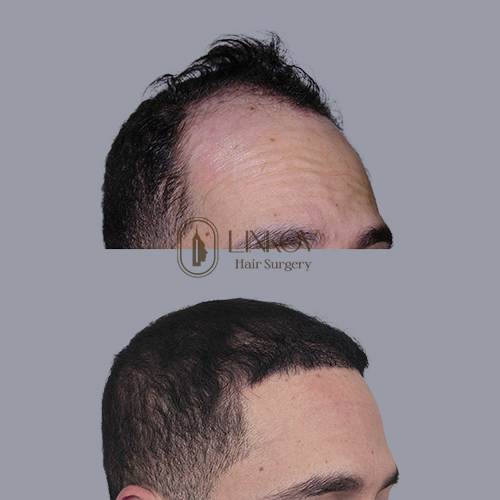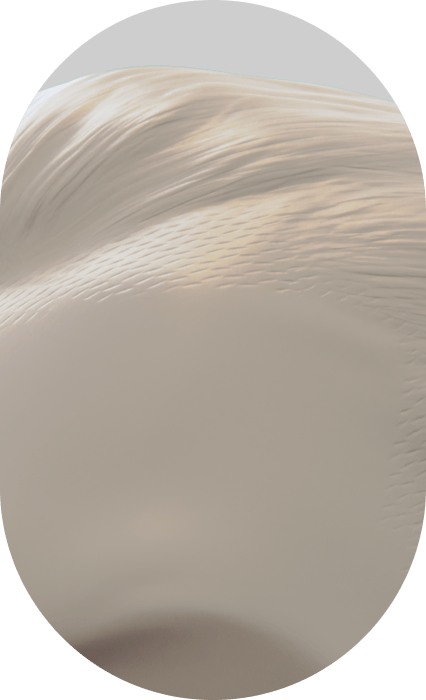Alopecia Areata (Autoimmune Condition)
Alopecia areata is a common cause of hair loss in men and women. It’s an autoimmune disease that compromises the growth process in your hair follicles. While certain medications can reverse the process, it takes an experienced expert in hair restoration to give you the best alopecia areata treatment, including informing you what’s possible and what’s not. Call our advanced hair transplant clinic in Manhattan today to set up an appointment with the city’s best doctor for a definitive diagnosis and effective treatment.

What Is Alopecia Areata?
Alopecia areata is an autoimmune disease that causes hair follicles to shrink. You shed hair as a result, leading to areas of thin growth and spreading patches of bald spots.
Since this condition is caused by your immune system attacking hair follicles, treatments for alopecia areata involve counteracting this phenomenon. Corticosteroids are anti-inflammatory drugs that ward off the signal to shrink hair follicles. Treatments with corticosteroids can come in the form of injections, creams and lotions, or in oral medications.
Because alopecia areata is so common, many treatment avenues are available. A hair loss specialist can find one that works for you. When any type of hair loss, seems unusual or bothersome, rely on the best hair restoration doctor in Manhattan at Linkov Hair Surgery for a clear diagnosis and treatment plans designed specifically for your unique needs for the best price.

What Are the Symptoms of Alopecia Areata?
Being able to recognize the signs is helpful for coming up with the most beneficial alopecia areata treatment plan for your future. The earlier you begin treatment, the better the chance of success you have for it to work. You typically first notice alopecia areata in the small patches of thinning or balding hair on your scalp or other areas of your body. These spots continually get larger until there are noticeable bald spots.
You may also note the rate of your hair loss. If hair seems to be falling out more frequently, with more and more hair loss each time you comb or wash your hair, this may be an early sign of alopecia, the clinical term for hair loss. Common symptoms that may point you to treatments for alopecia areata include:
- Spreading bald spots Areas of bald patches expand into a larger and more noticeable areas of your scalp. These spots become more and more difficult to cover with the remaining thinning hair.
- Hair loss in cold weather Cold weather causes your already shrinking hair follicles to contract even farther, speeding up the hair shedding process and lengthening the period of rest your hair spends before the growth cycle begins again.
- Itching sensations Although alopecia is for the most part physically painless, areas of your scalp may become itchy and overly sensitive in the time before that hair falls out.

What Are the Stages of Hair Loss?
The phases of hair loss are different in every individual, but doctors have found that there are patterns and stages that have notable attributes. For men, these stages are documented by the Hamilton-Norwood Scale. For women, stages of hair loss are categorized using the Ludwig Scale. In a general compilation of both scales, stages of hair loss follow general patterns that include:
Gradual thinning In the beginning stages of hair loss, lost hair may not even be noticeable, but hair seems to shed and fall out faster after brushing, washing or being exposed to cold weather
Small balding spots The thinning areas start to form noticeable small circles of baldness and patchiness in different areas of your scalp or body
Larger balding areas The small circles begin to expand with larger bald areas spreading at the crown of the head to begin with and increasing over the entire scalp
Complete hair loss Hair continues to recede down to the larger perimeter of your head and down to your ear line, leaving a bald scalp
The specific course of this condition differs from person to person, but you may notice several symptoms that show it’s progressing. Dr. Gary Linkov at Linkov Hair Surgery is not only a highly regarded, experienced hair restoration specialist, but he also understands the condition firsthand, as he has an autoimmune disease that caused his own hair loss. You can view a video he created concerning his struggles with alopecia areata.
What Are Effective Treatments for Alopecia Areata?
Luckily, there are many options for alopecia areata treatments. Oral medications and topical creams may work in some cases, or you may choose a permanent solution with one of the different kinds of hair transplants. Thanks to advances in robotic hair restoration technology, follicular unit extraction (FUE) and follicular unit transplants (FUT) have become popular among those who suffer from alopecia areata. These procedures provide natural-looking results due to the exquisite precision of hair placement.
Linkov Hair Surgery offers these transplant surgeries for men and for women, performed by celebrity-trusted surgeons. Other alopecia areata treatments available in New York City include:
FUE/FUT transplants FUE transplants involve extracting individual hair follicles from other parts of your body and implanting them in the balding areas. FUT transplants involve removing entire strips of hair to implant elsewhere
Medications The most common medication to treat alopecia is minoxidil, primarily sold under the brand name Rogaine. Other medications used to treat this type of hair loss include brands of spironolactone, finasteride — sold as Propecia, Carospir and Aldactone —and oral dutasteride drugs, such as Avodart. Prescription medications called Janus kinase (JAK) inhibitors are now being used to treat adults with severe alopecia areata.
Exosome therapy Exosome therapy involves injecting healthy messenger exosomes, which are similar to stem cells, from a donor into your scalp. These exosomes encourage hair growth and stimulate damaged hair follicles to repair and speed up the growth cycle process
Corticosteroid injections Steroids work to stop hair loss by blocking the immune system from attacking your hair follicles. Injections have proven to stimulate hair growth and regrow hair lost due to an immune attack
Contact Linkov Hair Surgery in New York City for an appointment to determine whether you need treatments for alopecia areata. No matter what’s causing your sudden or gradual hair loss, Dr. Linkov offers reliable solutions for the best price
Linkov Hair Surgery
150 E 56th St, #1A
New York, NY 10022
(212) 970-9404

